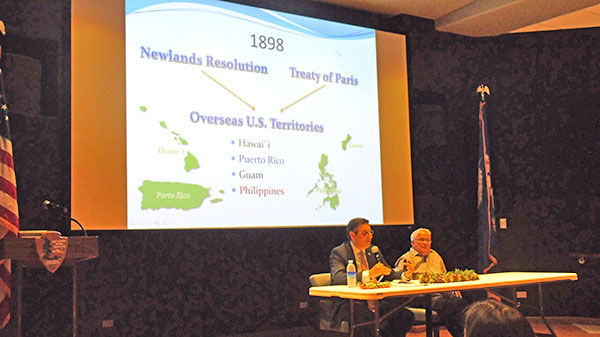Jessie Borja objects to Gelpi’s use of word territory for CNMI

U.S. District Court in Puerto Rico Chief Judge Gustavo A. Gelpi discusses the constitutional rights of U.S. territories as retired CNMI chief justice Jose S. Dela Cruz listens during his presentation at the American Memorial Park visitors center theater last Friday night. (Ferdie De La Torre)
Former lieutenant governor Jesus “Jessie” C. Borja took exception to U.S. District Court in Puerto Rico Chief Judge Gustavo A. Gelpi’s use of the word territory for the Commonwealth.
“I don’t think we are a territory as that term defines in the U.S. Constitution,” Borja said at the question-and-answer portion during Gelpi’s presentation on U.S. constitutional rights in the territories and the CNMI held last week at the American Memorial Park visitors center theater.
Borja said the territorial clause, as former CNMI Supreme Court Chief Justice Jose S. Dela Cruz stated, provides for plenary powers of the U.S. Congress over the CNMI.
“And I submit that it [territorial clause] doesn’t have the plenary powers,” the former lieutenant governor said.
Borja is a lawyer and a retired CNMI Supreme Court associate justice.
The Territorial Clause states that, “the Congress shall have power to dispose of and make all needful rules and regulations respecting the territory or other property belonging to the United States.”
In his presentation, Gelpi stated that the CNMI, the Mariana Islands, became a territory.
“I have to use the word territory because you need the Territorial Clause to acquire territory,” Gelpi pointed out.
He said the CNMI was not a territory like Puerco Rico acquired as far as the war is concerned, but it was a territory similar to Hawaii.
He said Hawaii, which has a long history, voluntarily chose to become a territory.
Gelpi said the Federated States of Micronesia and the Marshall Islands decided to become separate independent nations and have treaties with the U.S. and don’t have international representations.
“The CNMI says ‘no I want to be part of the United States, but I want a different agreement.’ So it reaches the commonwealth agreement. Very similar to Puerto Rico,” Gelpi said.
In response to Gelpi’s presentation, Borja said with respect to the slide that Gelpi showed about the congressional report, he agrees with what it states, but disagrees with its conclusion.
“Because it states in the report itself the exceptions to the plenary powers of U.S. Congress. And those exceptions are stated in our Covenant. And because of that we are not a territory. Because it doesn’t have plenary powers,” he said.
Gelpi replied that in principle Borja is correct.
“I understand that what you are saying… the intent of the creation of the Commonwealth. But the Ninth Circuit, don’t blame me, blame [it] on the Ninth Circuit, the Ninth Circuit is the one who created all the issues about the territory,” Gelpi said.
“In a lot of cases it is the one who said [it] under the Territorial Clause. But you have the Covenant, you have the Covenant. So that is the problem,” he said.
Gelpi said he is not saying that Borja is wrong, but that there’s a case at least with the Ninth Circuit saying that the Territorial Clause applies.
“But then you limit the Territorial Clause by the Covenant,” Gelpi said.
Gelpi said Borja’s exception is duly noted and that he believes that the former lieutenant governor made a very good point.
Gelpi’s presentation was made possible by funding from the National Endowment for the Humanities, through a grant award from the Northern Marianas Humanities Council.



























